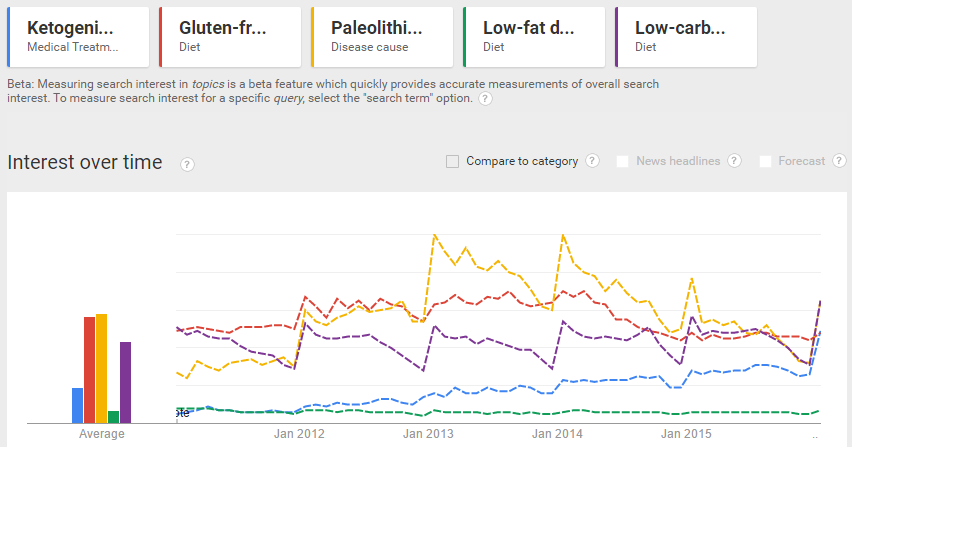The 2016 Dieting Season is Off and Running...
 Monday, January 11, 2016 at 5:18PM
Monday, January 11, 2016 at 5:18PM  After 22 years in this field I have to admit that I periodically get burnt-out on taking the time to read and review new diet books or websites!
After 22 years in this field I have to admit that I periodically get burnt-out on taking the time to read and review new diet books or websites!
Nearly 20 years ago Kelly Brownell PhD once likened fad-diets to trick candles that keep re-lighting when you try to blow them out. Each new crop of books (or websites) invariably claim, “to contain the REAL secrets to weight loss.” This of course is just basic marketing and it’s very effective, especially when the average consumer “knows” more misinformation than fact regarding human metabolism, energy balance, and body weight.
Since it’s January, I thought I’d take a look at what’s “hot” on the diet landscape (based on Google Trends data on internet searches; graphic below). The January 2016 data “spike” is for low-carbohydrate diets. While Paleo and Gluten-free are still popular the significant spikes in interest are for generic low-carbohydrate and ketogenic diets.

A ketogenic diet may sound new and even extra “science-y” to some. Dieters that have been around the block however, will recognize that ketosis (and using ketone test strips) was something first advocated in the 1970s by Dr. Robert Atkins. Atkins was the first to propose the notion that ketosis was necessary for “fat-burning” and enhanced weight loss (it’s not).
What's more, some of the latest ketogenic diets are more extreme than anything Atkins ever proposed, as they restrict protein (to 120-grams per day) while also keeping carbohydrates to just 25-grams per day. Given those limits on protein and carbs, fat is essentially promoted from "condiment" to "entree" status! So unless you're really into drinking vegetable oil, it's safe to say that that will not be an easy or enjoyable diet to attempt to follow! It's also a perfect example of the unnecessary hassle and complication fad-diets invariably demand!
Ketogenic diets are no magic bullet for weight loss; an in-depth discussion of why however will require a blog in itself which I will leave for another day. For today I will simply say that people lose weight secondary only to negative-energy-balance.
In other words (after equivalent levels of calorie-restriction are confirmed) any increase in weight loss attributable to playing with the intake-ratios of the macronutrients (protein, carbohydrate, and fat) is minimal, confirming the age old adage that, “You can’t outsmart Mother Nature.”
This is actually good news, because the reality is that you can lose weight following any diet that you find agreeable, and you can maintain your weight loss on any diet that you find agreeable. Ideally you would choose something that is also healthy! The latest US News Diet Rankings highlights healthy and effective diets depending on one's goals.
Whatever diet you choose appetite regulation is a key factor for success, and higher satiety is generally achieved by including 25 to 30 grams of protein with each main meal. That level of protein will also optimize preservation of your lean body mass and bone mineral density during weight loss which in turn will minimize the natural drop in resting metabolic rate associated with reduced body mass.
All the Best!
-Dorene
You may also be interested in:
Pick your approach to weight loss carefully. (RE: recognizing a fad-diet when you see one)
When is a calorie not a calorie? (RE: the interconnection of oxidation & storage of macronutrients)
Glycemic Index, Insulin & weight loss: what are the facts?
For more reliable information on healthy eating and weight loss check out my book (no magic, just the facts): The NEW Healthy Eating & Weight Management Guide.

